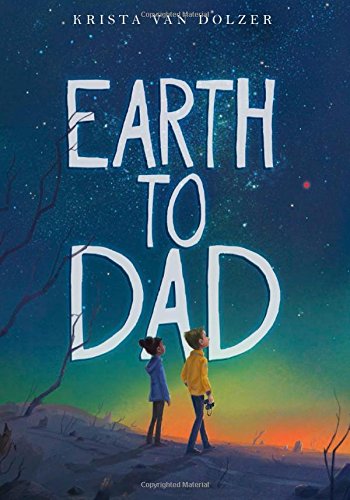
![]() Earth to Dad by Krista Van Dolzer
Earth to Dad by Krista Van Dolzer
Eleven-year-old Jameson O’Malley lives with his mother, Mina, at Base Ripley, in a version of Minnesota that would be unrecognizable to current-day residents: there are regular monsoons, category six tornadoes are commonplace, and spending more than a few moments outside without a protective solar-resistant jacket will lead directly to sun poisoning. A deeply introspective and solitary child, Jameson’s passion is his JICC (Jameson’s Interplanetary Communication Console), a device his astronaut father helped to build before embarking on the long voyage to Mars, and which they use to send short videos to one another on a regular basis.
As Earth to Dad (2018) begins, a new family has just moved into Jameson’s neighborhood, and he’s immediately drawn to the daughter, Astra Primm, who’s his age and is quite the little spitfire. Astra’s standoffishness and outright hostility don’t mask her grief over the recent death of her mother, a world-renowned climatologist whose own mission on Mars went terribly awry. While Jameson gets to know her better, the videos from his father become sparser and progressively odder, and his mother displays some increasingly erratic behavior of her own, including flirting with Mr. Primm and pulling Jameson out of his school’s Earth-to-Mars Destination Day celebrations. When Astra pushes Jameson to improve his JICC’s functionality, he stumbles upon information that makes him question everything he’s been told about his father and the life he’s been living.
Krista Van Dolzer’s story is written for a pre-teen audience, and though I do applaud her deft handling of the principle subject matter — separation of child from parent, whether it’s by death or a nearly-impassable distance — it may be easy for readers to figure out what’s going on long before Jameson does. His major emotional crises are resolved a little too quickly and neatly, much more than the adults around him, which doesn’t ring true for his age and near-isolation from his peers. Astra’s reactions (and over-reactions) are far more realistic to both her age group and situation, and she springs from the page whereas Jameson largely observes situations without truly engaging in them. I also have a lot of questions about the feasibility of Mina O’Malley’s intentions and behavior over the course of the previous few years, which don’t hold up under close scrutiny.
Earth to Dad’s strongest aspects are Van Dolzer’s evocative descriptions of a post-cataclysm Earth becoming less and less hospitable with every passing year, along with the measures taken by humanity’s remaining citizens to survive long enough to make Mars a suitable home. I’m not sure about the finer astrophysical points of what she describes, but the overall concept sounds about right: broadly, a rogue asteroid played havoc with the gravitational wells of several planets, Earth was knocked off course, and billions of people died just in the first year of sudden polar ice melt-offs. The people who live on military bases do so under strict rationing of food and supplies, while people who eke out a sparse existence outside the bases do so with much fewer resources at hand. Van Dolzer touches on the disparity between those spheres, but only briefly, since it’s not central to Jameson’s quest for answers; I do wish she’d expanded upon it a little more, or given Jameson time to consider the relative wealth and safety he takes for granted as a perk of his family’s military connection.
With emphases firmly on friendship and forgiveness, Earth to Dad is, at heart, a sweet story about having to grow up a little too quickly, but taking solace in friends and loved ones along the way.



The description of this book is so intriguing. I wish you had liked it more. I’m still tempted to get it for my 12 year old daughter.
I like the cover, too.
It’s entirely possible that I’m too far distant from the ages in question to get a good feel for the book. Your 12-year-old might have an entirely different (and more positive) reaction!